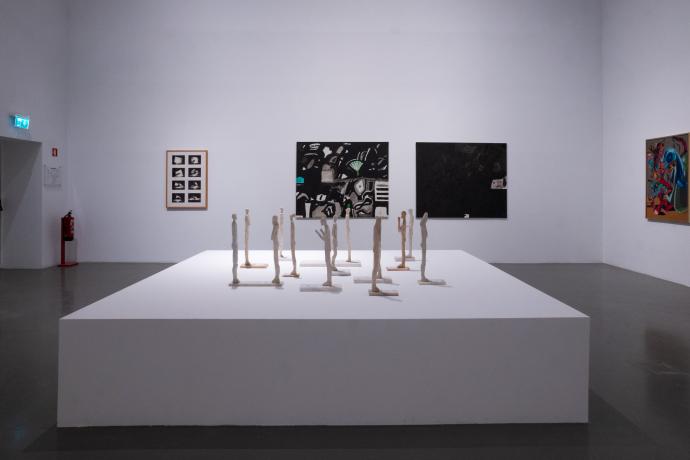Hoje Soube-me a Pouco
24 APR 2024 - 26 AUG 2024
MAAT Central

As part of the celebrations for the 50th anniversary of the 25th of April 1974 (the Carnation Revolution), Hoje soube-me a pouco [today didn’t feel enough] brings together a group of artists and works that marked the period after the founding moment of Portuguese democracy. It was a time of political and social change, but also a time of new attitudes and artistic expectations, which highlighted the commitment of artists to build strongly idiosyncratic and autonomous paths in relation to the collective utopias opened up by the revolution, and their works can be considered the richest cultural heritage of the very process of opening up Portuguese society. In addition to including several of the main figures of Portuguese contemporary art from the 1970s and 80s, the exhibition also features artists from more recent generations whose works continue and expand legacies and creative trends that emerged after 1974. Most of the pieces included in the exhibition belong to the EDP Foundation Art Collection.
Drawing on the EDP Foundation Art Collection, to which works from other private and institutional collections, as well as some previously unseen works, have been added, the exhibition favours some future lines triggered by the transition to democracy: symptoms of the artists’ introversion, through the explanation of their singularities (narcissistic drives, restlessness, emotions, personal fantasies...) and the ability to critically affirm them in the common space; the emergence of new themes and imagery (fictional, feminist, speculative...) that signal the fragmentation of the dominant narratives; a renewed attention to the subjects (figures, situations, objects, intimacy) of everyday life, and also a clear expansion of creative procedures, through an experimental slant in the use of media and materials, often through recollection, serialism and the hybridisation of artistic disciplines; and, finally, a clear interest in the issues and limits of language, namely through the choice of rhetorical stances (such as irony, parody, allegory) that emphasize the paradoxical nature of the work of art in its relationship both with reality and the viewer.
Participating artists
Gabriel Abrantes, Helena Almeida, Leonor Antunes, Eduardo Batarda, Maria Beatriz, Sara Bichão, Inês Botelho, Carlos Bunga, Fernando Calhau, Alberto Carneiro, Pedro Casqueiro, Lourdes Castro, Rosa Carvalho, Rui Chafes, António Dacosta, Armanda Duarte, José Escada, Carla Filipe, Horácio Frutuoso, Gaëtan , Patrícia Garrido, Ana Jotta, Álvaro Lapa, José Loureiro, Jorge Martins, Paulo Nozolino, Maria José Oliveira, António Palolo, Luísa Correia Pereira, Júlio Pomar, Adriana Proganó, Jorge Queiroz, Paula Rego, Pedro Cabrita Reis, Ana Santos, Julião Sarmento, António Sena, Ângelo de Sousa, Susanne Themlitz, Ana Vieira, Xana, Joaquim Bravo, Ana Hather,




